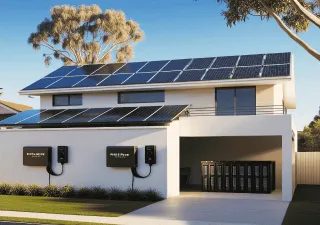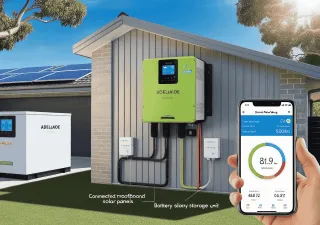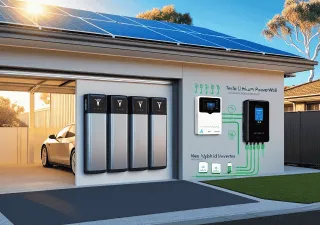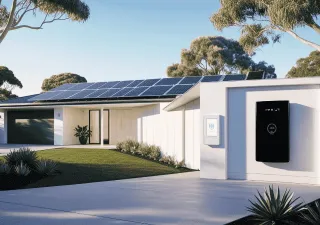Add a battery to your existing solar — charge by day, use at night, keep essentials on.
Battery Upgrades for SA Homes — AC-Coupled or DC-Coupled.
Choose AC-coupled to bolt a battery onto your current inverter, or DC-coupled to replace the inverter with a hybrid model for maximum efficiency and backup options. Then pick your ecosystem: GoodWe or Sungrow.
Pick your connection method
Keep your current solar inverter. We add a battery with its own inverter/charger on the AC side. Great when your existing inverter is healthy and under warranty.
Swap your existing inverter for a hybrid inverter and connect panels + battery on the DC side. Best efficiency, simpler backup, and a clean upgrade path.
Choose your inverter + battery brand
We’ll confirm single/three-phase supply, switchboard space and backup circuits during your site inspection.
Book a site inspection or get an instant quote.
Pick your system and complete everything right here without leaving the page.
By submitting, you agree to be contacted about your request. Finance subject to approval; T&Cs apply.
Frequently Asked Questions
Clear answers about retrofitting batteries to existing solar in South Australia.
Which is better for me — AC or DC-coupled?
Can I keep generating solar if the grid goes down?
Do GoodWe and Sungrow support both methods?
How big should my battery be?
Will export limits or phase type affect my upgrade?
Latest News

The Power of Sunlight: An Overview of Solar Energy for Homes in Adelaide
Discover how solar energy can power your Adelaide home while slashing energy bills. Learn about panels, batteries & rebates with Rite Price Solar’s expert guide. ...more
Solar Energy ,Solar Panels Solar Inverters Solar + Battery &Solar Power
March 25, 2025•6 min read

A Historical Overview of Solar Energy Utilisation: Insights for Adelaide Homeowners
Discover the evolution of solar energy—from ancient fire-starting to modern solar panels powering homes in Adelaide. Explore solar's rich history and future in SA. ...more
Solar Energy ,Solar Panels Solar + Battery &Solar Power
March 25, 2025•7 min read

Solar Inverters for Residential Applications in Adelaide, South Australia
Explore solar inverter types for Adelaide homes. Compare string, hybrid & microinverters. Trusted installation & advice from Rite Price Solar. ...more
Solar Energy ,Solar Inverters Solar + Battery Fronius &Solar Power
March 25, 2025•7 min read

Solar Batteries: An Analysis of Technologies, Economics, and Integration within Solar Energy Systems
Compare solar batteries in Adelaide. Discover costs, types, and benefits of storage. Explore solar + battery solutions with Rite Price Solar. ...more
Solar Panels ,Battery Storage Solar + Battery &Solar Power
March 25, 2025•6 min read

Solar Panels Adelaide | Best Solar Panel Guide for SA Homes
Explore solar panel types, benefits & installation in Adelaide. Learn how to save with Rite Price Solar & boost your home's energy efficiency. ...more
Solar Energy ,Solar Panels Solar Inverters &Solar Power
March 24, 2025•5 min read

Solar Battery Storage Adelaide | Maximise Your Solar Savings
Store solar power, cut your energy bills, and gain backup protection. Discover the benefits of solar battery storage for Adelaide homes with Rite Price Solar. ...more
Solar Energy ,Solar Panels Solar + Battery Battery Upgrade &Solar Power
March 24, 2025•5 min read
